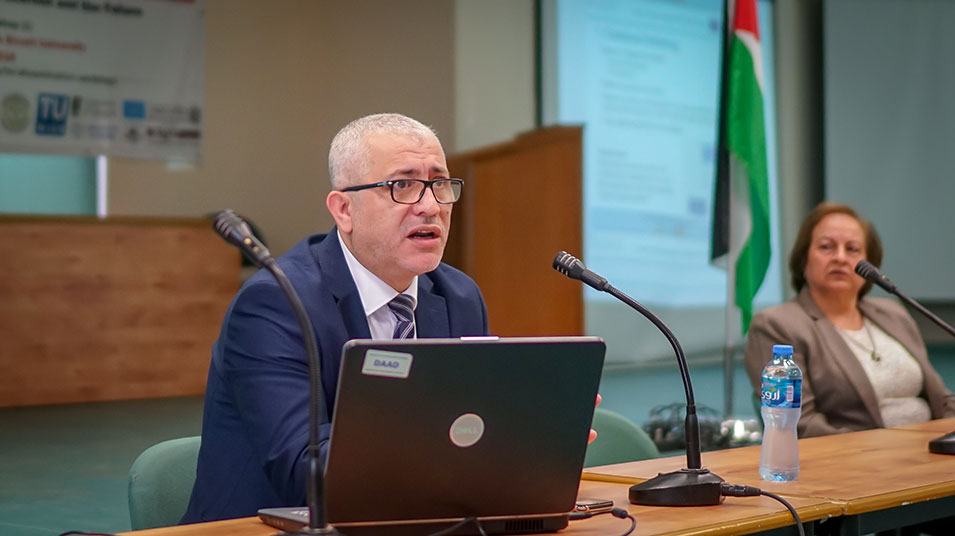Birzeit hosts workshop on establishing open-access research repositories in Palestine
Birzeit University, together with the Islamic University of Gaza through video conference, hosted a dissemination workshop for the “Research Output Management through Open Access Institutional Repositories in Palestinian Higher Education Institutions” (ROMOR) project, on Wednesday, November 21, 2018.
The Erasmus+-funded project aims to advance the management of scientific research in Palestinian higher education institutions through training on, and implementation of, open-access institutional repositories.
In addition to creating and supporting open-access repositories, the project also fosters scholarly communication and coordination between Palestinian universities and their international counterparts.
ROMOR includes four Palestinian and four European universities, which are: The Islamic University of Gaza, Birzeit University, Al-Quds Open University, Palestine Technical University - Kadoorie, Technische Universitaet Wien, Universita Degli Studi Di Parma, the University of Brighton, and the University of Glasgow.
Henry Giacaman, vice president for academic affairs at Birzeit University, emphasized the role of open-access research repositories, which advance academic research and studies and disseminate their results to the public and other researchers and academics. Such improvements, he said, align with Birzeit University’s message in advancing academia and society as a whole.
“The technological changes that have affected many aspects of our lives have also advanced academia, teaching, and research,” added Giacaman. “Scientific publishing, as the main mechanism through which scientific knowledge is conducted, is directly affected by those changes. In the past decades, a new paradigm in publishing - open-access publishing - has attracted a lot of authors and institutions.”
The recent advances in open-access publishing and institutional repositories, noted Giacaman, put the onus for digitizing and publicizing Arabic-language knowledge production on Arab researchers and academic institutions, so that research results are available to a wider audience.
Nasser Farahat, president of the Islamic University of Gaza, stressed the role of Palestinian universities as producers of new knowledge and pioneers in scientific research. Palestinians and Arabs, however, do not benefit from the results of those studies and research papers, he commented.
The ROMOR project, Farahat said, will benefit researchers, academics, students, and the general public by better disseminating the results of scientific research and attracting more authors and institutions.
Walid Sweileh, head of the Palestinian Accreditation and Quality Assurance Commission, remarked that open-access repositories allow Palestinian universities to compete on a greater scale in international university rankings and indexes, adding that developing and promoting such repositories would increase the rankings and international recognition of Palestinian researchers and academics.
The workshop, entitled “Establishing Open-Access Institutional Repositories in Palestine:
The Current Situation, the Lessons Learned, and the Future,” included three sessions. The first, chaired by Adnan Yahya, a professor of electrical and computer engineering at Birzeit University, was entitled “Introduction to Open Science,” and featured Rawia Awadallah, from the Islamic University of Gaza, and Talal Shahwan, from Birzeit University.
The second session, entitled “Training and Teaching: Mobility Activities,” was chaired by Samir Afifi, a professor of environmental science at the Islamic University of Gaza, and featured Wael Al-Sarraj, from the Islamic University of Gaza; Thabet Sabbah, from Al-Quds Open University; Mohammad Al Khateeb, from the Palestine Technical University - Kadoorie; Bilal Al Nabris and Mohammad Al Astal from the Islamic University of Gaza; and a number of students who went on exchange trips as part of the project.
The third session, entitled “Implementation of the National Roadmap,” was chaired by Wael Hashlamoun, a professor of electrical and computer engineering at Birzeit University, and featured Iyaad Alagha, from the Islamic University of Gaza; Diana Sayej, from Birzeit University; Yousef Abu Zir, from Al-Quds Open University; Nael Salman, from the Palestine Technical University - Kadoorie; Adnan Yahya, from Birzeit University; Samir Afifi; and Walid Sweileh who represented the Ministry of Education and Higher Education.
An open discussion with the attendees, followed by final remarks and notes by Awadallah, marked the end of the workshop.









